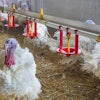There are a bunch of biosecurity programs in the U.S. swine industry that looked very good on paper, but when challenged by porcine epidemic diarrhea (PED) virus, they haven't been able to stop its spread. A biosecurity plan may call for the entrance of each barn to have a boot dip pan, for the farm to be shower-in, or for there to be a fence to exclude vehicles, but it takes people following procedures every time, every day, to make it work.
I think that what has happened with pest control programs in the layer industry provides a good example of what needs to happen in the area of biosecurity. All layer farms have had fly and rodent control programs for years, and the majority of these farms still had fly and rodent issues. When fly and rodent control became one of the cornerstones of Salmonella enteritidis prevention programs, farm owners, managers and employees quit accepting the status quo that there would always be rodents and flies in the barns and have virtually eliminated them on many farms. In order for a biosecurity program to stand up against a disease challenge, it will take the same type of commitment from everyone involved in the operation.
The culture has to be that it is never OK to bypass a biosecurity measure. If a dip pan is a good idea, you have to use it every time. Because human nature will bring most people to the path of least resistance, supervisors and managers have to be aware of this and monitor the situation. Talk to your employees; they may have a better idea about how access should be restricted or how equipment should be cleaned. One of the first lessons I learned as a supervisor was that "what gets measured gets fixed." If supervisors and managers aren't following biosecurity measures or aren't monitoring what employees do themselves, your program won't work.


















